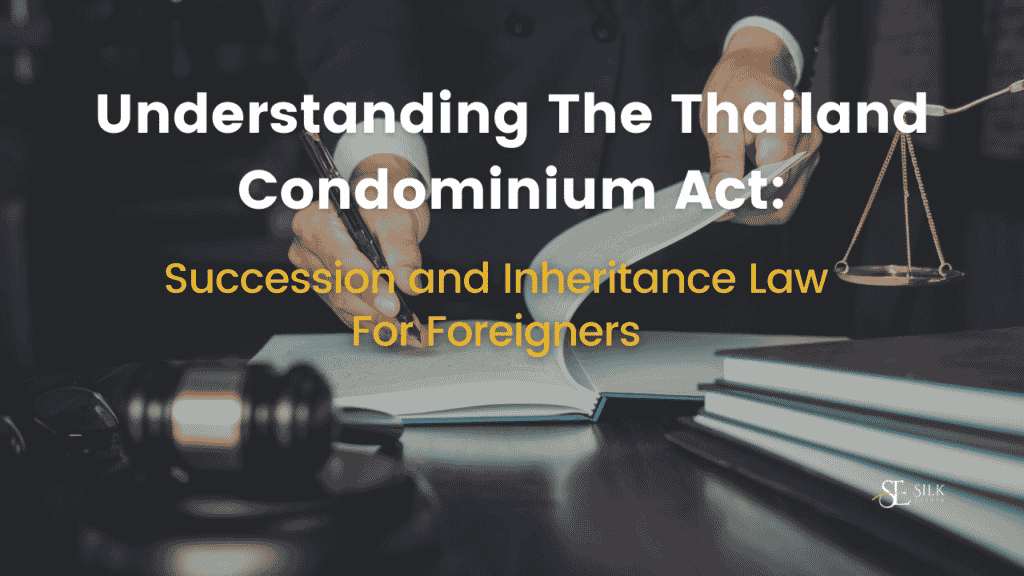Thailand as a Kingdom and country is considered to be foreigner-friendly wherein travellers from all over the globe are warmly welcomed into the land and made to feel at ease and at home. More often than not, Thailand turns out to be the perfect destination for travellers for short stays and even for Work From Home Corporate employees. This land also welcomes investors and global citizens seeking to invest in the development of the country.
All these factors may give foreigners the impression that Thailand will make a perfect home for themselves and their families. Foreigners may also believe that if they wish to stay in this wonderful tropical paradise for extended periods, then investing in a condo for themselves and their heirs is a great idea!
Contrary to this popular belief Thailand is not foreigner-friendly as far as laws about real estate purpose for succession goes. While it is indeed possible for foreigners to purchase one or more condo units for living there or as an investment, the inheritance laws are rigid and don’t allow for succession with a few exceptions. Continue reading to find out the inheritance laws for condos and property exceptions that permit succession for heirs.
Freehold Ownership Property Rules For Foreigners
Foreigners are allowed to own property in Thailand limited to Condos and Condotels. The title deed can be in their name or a joint partnership name for eligible spouses. Foreigners that have purchased condos in Thailand cannot legally sell the property to other foreigners freely and independently. Foreigners can legally transfer property to other foreigners under Section 19 of the Condominium Act of the Thailand Kingdom, provided both parties meet the eligibility criteria.
Section 19/ 2 bis of the Thailand Condominium Act states that condo freehold property can be purchased by foreigners if the complex has a maximum of 49% foreign ownership shares. The minimum quota of 51% of Thai citizens’ share must be met without fail. This section is further applicable for inheritance and succession as one of the main clauses to transfer property to another foreigner upon the death of the original title deed owner.
Inheritance And Succession Property Rules for Foreigners
Section 19 of the Thailand Condominium Act prohibits foreigners from leaving the condo to their heirs unless they are eligible to do this. The eligibility criteria are straightforward and a lawyer can set up the agreement as well as the last will testament if the foreigner is indeed eligible.
To ensure that there are no hiccups and problems after the death of the original foreign national title deed owner, legal professionals often advise their foreign clients to mention the names of their heirs in the condo’s Purchase and Sale Agreement. Furthermore, the main Will and Inheritance Testament should mention the details of the condo as well as the details of the heirs. A copy of the will must be kept in both Thailand as well as in the home country of the foreign title deed owner.
Eligibility For Transferring Property For Foreigners with A Will
To be eligible to transfer the condo to heirs and successors, the foreigner has to provide valid proof to the Land Department that clearly shows he is eligible for the transfer.
This should ideally be done at the time of registering the Condo with the Land Department through a lawyer and with the help of a real estate agent as well.
The eligibility of heir and succession transfer laws under section 19 are as mentioned below:
- Basic eligibility includes that the foreigner must be permitted to enter, live and purchase land in Thailand as per the immigration law.
- Other eligibility includes foreigners that are entering Thailand under the investment promotional law and are contributing to the development of the Kingdom through the Board of Investment.
- Juristic persons are eligible under Sections 97 and 98 of the Land Code provided they are registered as Juristic persons as per the laws of Thailand. This would include the eligibility of foreigners through section 4 of the Foreigners Business Act of Thailand. This would need a valid certificate of investment to provide for registration with the Land Department.
- Juristic persons and foreigners who purchase condos are eligible to transfer the condos to heirs provided they purchase the condo using funds from a foreign bank account and then pay for the condo in Thai Bahts. Any funds that are used for condo purchases cannot come from earnings in Thailand and from business funds that are generated in Thailand. This includes transfer fees, government taxes and the cost of the condo. This includes any taxes that are paid for the maintenance of the upkeep of the condo from the date of purchase until the sale or transfer of the condo to the heirs.
Laws of Successions for Heirs Who Are Unqualified Foreigners
- If the heirs that are inheriting the condo do not meet the above eligibility criteria and do not live, work, or have a business in Thailand as per the immigration and promotional investment act then they are considered unqualified foreigners. In such a situation, Thailand Land rules demand that the unqualified foreigners have to sell the acquired condo in a maximum period of 1 year from the date of succession.
- In addition, the unqualified foreigner also termed an alien, has to write a legal letter to the Competent Official within a maximum time frame of sixty days from the date of the inheritance. If the disposition isn’t done in 60 days and the property isn’t sold in 365 days from the date of inheritance then as per para 4 of Section 19, this would imply mutatis mutandis.
- If the heir who is an unqualified foreigner fails to dispose of the condo in the stipulated time frame of 365 days from succession, then the Land Department is legally obliged and permitted by Thai law to dispose of the property. In addition, the Land Department is permitted to retain a fee of 5% as well as other government fees, taxes and charges. The remaining money will be given to the foreign heir once the fees have been deducted as per the Thailand Condominium Law.
- After inheriting the condo, transfer fees and government fees are applicable, especially if the unqualified foreigner is trying to change his/her status to that of an eligible foreigner. To do this, the heir has to purchase the said condo out of the estate’s price for the appraised value. The purchase amount has to be at least equal to the final appraised value by the government of Thailand. It is crucial to note that the money used for this purchase has to come from a foreign bank account.
- Lastly, the foreign heir has to fill out, sign and submit the FET form as proof to the Land Department to be eligible as a qualified foreigner.
Know Your Rights as A Foreign Condo Buyer in Thailand
To avoid running around from pillar to post for condo purchase and inheritance purposes, select a good real estate guide and agent. While real estate guides and agents may charge a nominal fee for their assistance, this price is nothing compared to the hassles and extra costs your heirs will incur if the documents and title deed are not in perfect order.
Choose reliable and reputable Thailand real estate agents like Silk Estate who can give you peace of mind and ensure that your condo is transferred to your heirs without any fuss. Visit the Silk Estate Website today to know more!
You may be interested in this post >>> What Laws in Thailand Should I be Aware of Before Visiting?
You may be interested in this post >>> Reasons for The Influx of Foreigners that are Investing in The Thailand Real Estate Market




